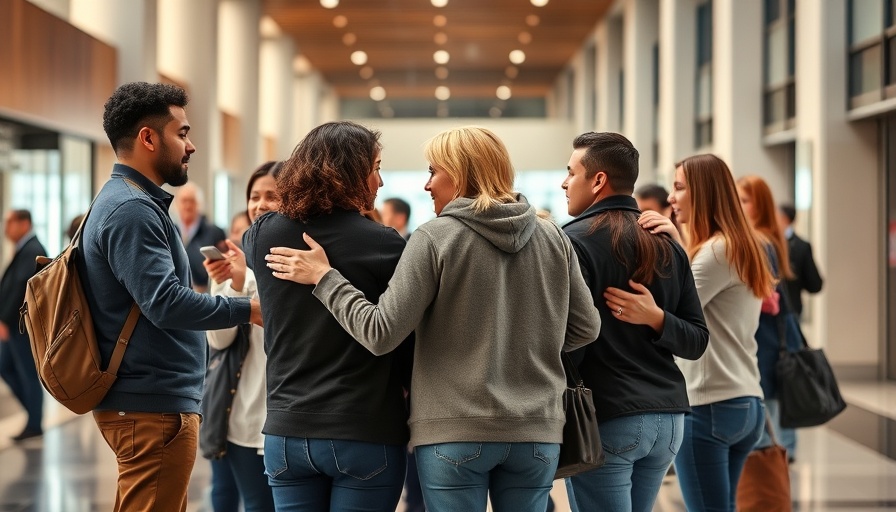
A Troubled Path: The Asylum Quest of Kilmar Abrego Garcia
The plight of Kilmar Abrego Garcia, a Salvadoran national, serves as a stark reminder of the ongoing humanitarian issues enveloping the realm of immigration in the United States. In a move reflecting the stringent immigration policies instituted during the Trump administration, Garcia's attempts to avoid deportation to Uganda underscore a troubling intersection of human rights and political maneuvering.
In Kilmar Abrego Garcia seeks asylum in US to avoid deportation to Uganda, the discussion dives into the complexities of human rights and immigration policies, prompting a deeper analysis on our end.
Historical Context: The Legacy of Hardline Immigration Policies
Garcia's case is emblematic of a broader trend in U.S. immigration policy, especially during the late 2010s. Under the Trump administration, policies such as detention and rapid deportation altered the immigration landscape, making it increasingly treacherous for those seeking refuge. The international spotlight on Garcia, who was previously wrongfully deported to a perilous jail in El Salvador, further complicates the narrative, revealing a system strained under conflicting mandates.
Political Implications: Uganda's Role in the Narrative
As reported by Garcia's lawyers, the possibility of his deportation back to Uganda poses a legitimate threat to his safety, with fears of persecution and torture surfacing in the discourse leading to the October court ruling. Amidst these developments, critics within Uganda have suggested that the U.S. has orchestrated deals to exert pressure on President Yoweri Museveni, contributing to the complexity of diplomatic relations and raising concerns about ethics in migration reform.
Dimensions of Justice: The Fight Against Deportation
Garcia's legal team has framed his battle against deportation as not just an individual struggle, but as part of a larger narrative on the rights of immigrants and asylum seekers. They assert that his deportation would serve as punishment for exercising his rights and resisting injustices. This situation highlights the precarious position of many individuals caught in legal limbo, caught between the pursuit of justice and governmental push for expediency.
Human Rights Considerations: The Asylum Process and Its Challenges
The international community, along with human rights advocates, continuously raises questions regarding the treatment of asylum seekers within established immigration frameworks. Garcia’s case epitomizes the fears many harbor: that seeking asylum may lead to more significant repercussions instead of protection from violence and persecution. This situation exemplifies the urgent need for a reformative approach to asylum laws, echoing the calls for humane treatment amidst complex geopolitical landscapes.
The Reality of War Against Immigration Reform
Garcia’s battle is not merely personal; it reflects the struggles of countless immigrants navigating a hostile framework. As debates around immigration reforms persist, Garcia’s legal proceedings will undoubtedly contribute to a broader acknowledgment of the human stories hidden within legislative rhetoric. The reality is that policies must evolve to ensure transparency, ethically sound decisions, and, most importantly, the fundamental human right to seek safety.
Future Implications: Refugee Rights in a Changing Environment
The outcome of Garcia’s ongoing legal saga holds profound implications not only for his personal future but also for how the U.S. handles asylum cases in the years to come. It compels us to consider critical questions: How can the system become more transparent? What measures can be put in place to ensure the humane treatment of asylum seekers? As the integrity of international human rights obligations is tested, Garcia’s ordeal underscores a crucial need for sustained advocacy and awareness.
Conclusion
In analyzing the circumstances around Kilmar Abrego Garcia’s attempts for asylum in the U.S., we delve into the painful realities faced by individuals under the shadow of strict immigration policies. As the October hearing approaches, it is essential for professionals and the public alike to engage with these critical issues, advocating for a more just and humane immigration system. Amidst these complex narratives, the voices of those affected must resonate louder against an often indifferent political backdrop.
Stay informed and engaged with current events about immigration policies and advocacy. For more insights on the humanitarian crises and political changes in America and beyond, follow reputable news sources that prioritize real-time updates.
 Add Row
Add Row  Add
Add 




Write A Comment